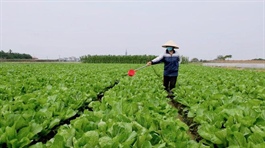Door wide open for processed, manufactured products to enter UAE
Door wide open for processed, manufactured products to enter UAE
Products of the processing and manufacturing industry of Viet Nam now have great chances to enjoy stronger export to the UAE, which has high demand for imports.

Dubai is stepping up urbanisation and infrastructure development, leading to higher demand for electricity and energy in industrial and trade sectors. The development of smart grids and upgrade of transmission lines will also boost the UAE’s electrical cable market.
The UAE’s electrical cable market was valued at US$192.48 billion in 2021 and is forecast to grow by some 4.2 per cent on average between 2022 and 2030. Therefore, electrical cables are a highly potential product for Vietnamese enterprises to invest in and export to the middle eastern country, said Truong Xuan Trung, an official of Viet Nam’s Trade Office in the UAE, as cited by the Cong Thuong (Industry & Trade) newspaper.
Among other processed and manufactured products, Viet Nam can also boost the shipment of handbags, suitcases, and wallets, he suggested.
In 2022, footwear exports to the UAE brought home $185 million, rising nearly 50 per cent from a year earlier; textiles and garments $132 million; timber and wood products $27 million, statistics show.
The Handicraft and Wood Industry Association of HCM City has registered to take part in a woodworking fair in the UAE in 2023. This event, which will gather many international exporters and importers, will be a good chance for Vietnamese firms to seek partners, Trung said.
In addition, some agricultural and fishery products of Viet Nam are holding a big market share in the UAE and can be exported more to this market.
Data in 2022 show that fishery exports to the UAE increased by over 18 per cent year on year. Viet Nam is currently the biggest exporter of frozen tra fish fillet there, with an over 50 per cent market share. Such fruits as dragon fruit, watermelon, and seedless lime from the Southeast Asian country are also dominating this market.
However, the UAE is a market with fierce competition in terms of prices and quality, the official noted, adding that the Islamic country requires food and beverage imports to have Halal certificates, and also imposes high import tariffs, up to 50 per cent, on sugar-sweetened beverages.
Despite considerable challenges, Trung held that the UAE is attractive enough for Vietnamese firms to capitalise on since it is a highly open market, has few tariff barriers, and serves as a point of transit for goods to reach the Middle East, Africa, and Southern Europe.
Besides, the UAE is a party to the Gulf Cooperation Council (GCC), whose members share a common customs law system, so when Vietnamese goods are exported to this market, they can enter other GCC members without having to pay more taxes.
The UAE has asked Viet Nam to consider the early signing of a bilateral comprehensive economic partnership agreement so as to further facilitate Vietnamese products’ entry into the Middle Eastern country, according to Trung.


















